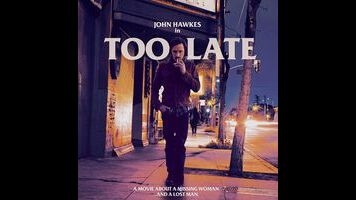Dennis Hauck is either a visionary or just really well connected. With only a handful of shorts on his resume, the writer/producer/director managed to land serious actor John Hawkes to star in what is clearly a low-budget passion project. And it must have been a fun role: Hawkes is predictably adept as Sampson, a ferociously independent, glamorously grizzled private investigator who seems to have stepped straight out of the ’70s. The main thrust of the deliberately fractured plot is that Sampson has been charged with locating a missing woman named Dorothy (Crystal Reed), whose disappearance leads him deep into the corrupt underbelly of Los Angeles, where, according to the laws of movies, he must encounter Robert Forster at some point.
That throwback plot fits perfectly with the film’s gritty aesthetic, captured in 35mm in a series of five scenes, each 20 minutes—or 2,000 feet of film—long. Each scene is shot in one uninterrupted take, an undeniably difficult and ambitious technique, especially given the limitations of the 35mm equipment. And the results are impressive, especially in the opening sequence dramatizing Dorothy’s disappearance from an L.A. park, which contains some nimble camerawork that it’s hard to believe was achieved in one take, let alone on film. This bravura camerawork, along with Hauck’s insistence on only screening Too Late in 35mm, will surely dominate much of the conversation about the film.
But look beyond that gimmick—and it is a gimmick—and Too Late reveals itself to be a throwback in some unflattering ways as well. Hauck’s writing, and particularly his stylized dialogue, is heavily influenced by the Quentin Tarantino school of tough-guy filmmaking (with some reverence to Robert Altman and Brian De Palma as well, but that comes with the territory). And like most Tarantino wannabes, he tries too hard. As a result, although the cast seems game, only Hawkes is really able to convincingly pull off the affected, pop-culture reference-laden dialogue. Which wouldn’t be a big deal if this wasn’t such a dialogue-driven film.
Put flippantly, this means that if you enjoy strippers delivering monologues on Bugs Bunny—something that actually happens in this movie—then Too Late will scratch that same adolescent itch that leads young film buffs to dress in black suits and Ray-Bans after seeing Reservoir Dogs for the first time. Hauck clearly loves movies. He references them constantly in his script, and fills his sets with sly little references like the Ms. 45 poster hanging on a projection-booth wall. He likes women, too, especially tough-talking, half-dressed ones. And all of those things hold a certain undeniable appeal. But if you’re looking for something a little more grown-up than that, you’ll have to wait for next time.

